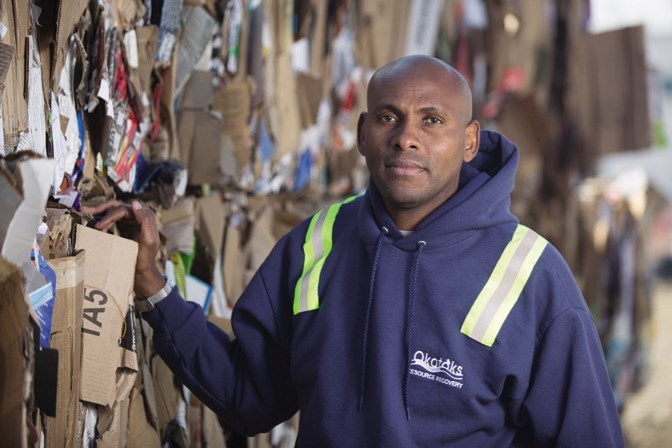Okotoks residents could see waste management fees reduced in the future as recycling programs bring down disposal costs.
Though savings at the landfill may be offset by increases in tipping fees, salaries or contracts for third-party collection for organics or recycling, waste services manager Paul Lyons said the cost of garbage disposal is on the decline.
It’s calculated from projected amounts of waste diverted from the landfill last year, he said.
“The cost savings is all based on projection, it’s not based on actuals,” said Lyons. “If you were to look at the actual budget, I think we went down by a few thousand dollars. Our budget this year for waste disposal was $201,000 and that was significantly less than the year before.”
Cost savings are calculated into rates for residents at the beginning of the year, he said.
Currently, Okotoks residents are charged a $41 waste services fee on their utility bill every two months. During budget deliberations last week, and Lyons proposed $44.15 for 2018, which will offset administrative and operating costs of the waste management program.
Rates are based on the cost to administer the waste services program, including landfill and contract fees, divided by the number of paying clients in town, he said. The more organic waste is diverted from the landfill, the lower the cost to the Town, he said.
“Organics is cheaper to dispose of, so the difference between the disposal costs for the landfill and organics would be the cost savings,” said Lyons.
He said the 2018 budget includes a projected increase in the amount of waste diverted from the landfill, which could result in lower fees in 2019, depending on actual numbers and operating costs.
Waste management rates are calculated from the previous year’s numbers because it takes a full 12 months’ worth of data to determine the appropriate fee for residents, said Lyons.
He said the Town also realizes additional savings, some of which aren’t as tangible.
One of the biggest benefits is the reduction in waste going to the landfill, which results in saving space for use down the road, when prices may have increased if landfill space was at a premium, said Lyons.
When waste is diverted from the landfill it also impacts methane levels, reducing the impact of greenhouse gas emissions in the region, he said.
“So savings are monetary, they are long-term, but they are also based on the greenhouse gas emission that we would not have contributed to the landfill,” said Lyons. “All the benefits, the benefits are really social, environmental and economic, not just economic alone.”
There may also be an impact on the wastewater treatment plant, if people were to convert from using kitchen disposal systems (garburators) and use the organic collection system instead, he said. Organics in the wastewater put more pressure on the water treatment system as it chemically treats the water and removes effluent before returning it to Mother Nature.
It’s more difficult to identify, because Okotoks never flagged garburators as particularly harmful, though the Town discourages their use, he said. There isn’t any data to prove whether residents were using their disposal systems and which of those households may have ceased usage and converted to the organic bins, he said.
Most of the data collected in Okotoks revealed residents who weren’t composting their food waste were throwing it in the garbage and sending it to the landfill, he said.
“It would be correct to say there would be changes in cost associated with switching to green bins, but it would have had to have been significant enough on our wastewater treatment plant where we had this extra loading and we saw it being diverted,” said Lyons. “In theory it’s correct, but there’s nothing to suggest, from our end, that it has happened.”




